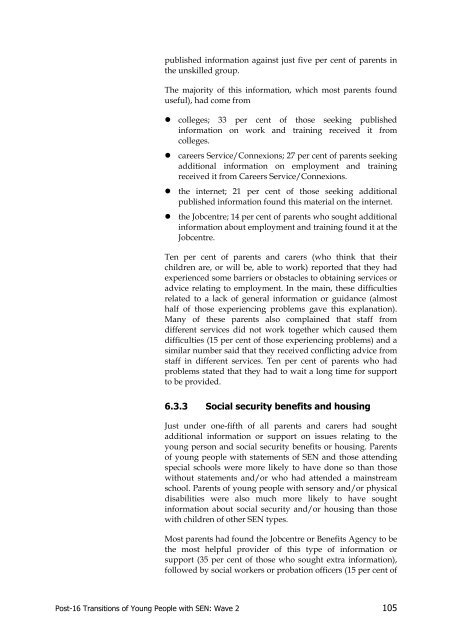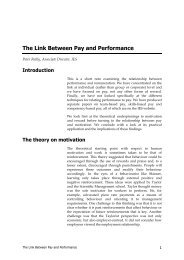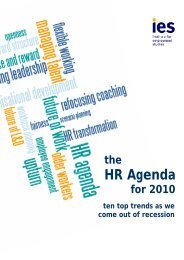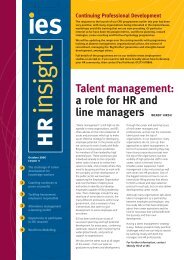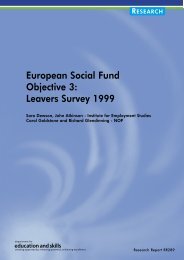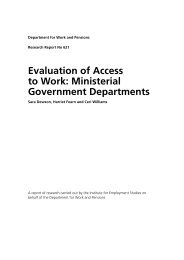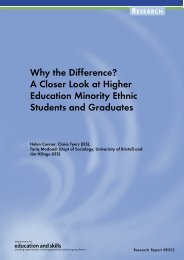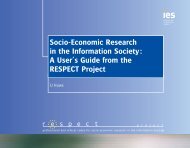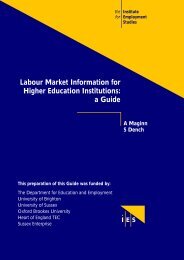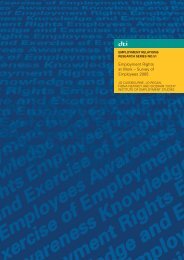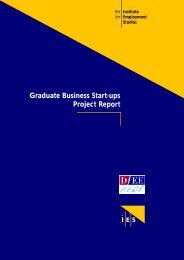Post-16 Transitions: a Longitudinal Study of Young People with ...
Post-16 Transitions: a Longitudinal Study of Young People with ...
Post-16 Transitions: a Longitudinal Study of Young People with ...
You also want an ePaper? Increase the reach of your titles
YUMPU automatically turns print PDFs into web optimized ePapers that Google loves.
published information against just five per cent <strong>of</strong> parents in<br />
the unskilled group.<br />
The majority <strong>of</strong> this information, which most parents found<br />
useful), had come from<br />
• colleges; 33 per cent <strong>of</strong> those seeking published<br />
information on work and training received it from<br />
colleges.<br />
• careers Service/Connexions; 27 per cent <strong>of</strong> parents seeking<br />
additional information on employment and training<br />
received it from Careers Service/Connexions.<br />
• the internet; 21 per cent <strong>of</strong> those seeking additional<br />
published information found this material on the internet.<br />
• the Jobcentre; 14 per cent <strong>of</strong> parents who sought additional<br />
information about employment and training found it at the<br />
Jobcentre.<br />
Ten per cent <strong>of</strong> parents and carers (who think that their<br />
children are, or will be, able to work) reported that they had<br />
experienced some barriers or obstacles to obtaining services or<br />
advice relating to employment. In the main, these difficulties<br />
related to a lack <strong>of</strong> general information or guidance (almost<br />
half <strong>of</strong> those experiencing problems gave this explanation).<br />
Many <strong>of</strong> these parents also complained that staff from<br />
different services did not work together which caused them<br />
difficulties (15 per cent <strong>of</strong> those experiencing problems) and a<br />
similar number said that they received conflicting advice from<br />
staff in different services. Ten per cent <strong>of</strong> parents who had<br />
problems stated that they had to wait a long time for support<br />
to be provided.<br />
6.3.3 Social security benefits and housing<br />
Just under one-fifth <strong>of</strong> all parents and carers had sought<br />
additional information or support on issues relating to the<br />
young person and social security benefits or housing. Parents<br />
<strong>of</strong> young people <strong>with</strong> statements <strong>of</strong> SEN and those attending<br />
special schools were more likely to have done so than those<br />
<strong>with</strong>out statements and/or who had attended a mainstream<br />
school. Parents <strong>of</strong> young people <strong>with</strong> sensory and/or physical<br />
disabilities were also much more likely to have sought<br />
information about social security and/or housing than those<br />
<strong>with</strong> children <strong>of</strong> other SEN types.<br />
Most parents had found the Jobcentre or Benefits Agency to be<br />
the most helpful provider <strong>of</strong> this type <strong>of</strong> information or<br />
support (35 per cent <strong>of</strong> those who sought extra information),<br />
followed by social workers or probation <strong>of</strong>ficers (15 per cent <strong>of</strong><br />
<strong>Post</strong>-<strong>16</strong> <strong>Transitions</strong> <strong>of</strong> <strong>Young</strong> <strong>People</strong> <strong>with</strong> SEN: Wave 2 105


